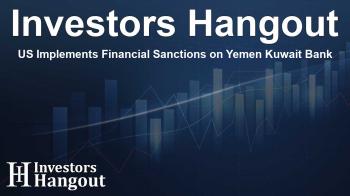US Implements Financial Sanctions on Yemen Kuwait Bank

New Sanctions Targeting Yemen's Financial Institutions
The recent move by the U.S. government to impose sanctions on Yemen Kuwait Bank marks a significant step in its ongoing efforts to diminish the influence and financial capabilities of the Houthis. This action is part of the broader strategy of the Biden administration aimed at applying pressure on this militant group, significantly ahead of any upcoming changes in leadership.
Reasons Behind the Sanctions
According to the U.S. Treasury Department, Yemen Kuwait Bank has been accused of complicity in the financial machinations of the Houthis, helping them exploit the local banking system for money laundering and transferring funds to their allies, including Hezbollah from Lebanon. This has raised serious concerns regarding the risk it poses not only to Yemen but also to international peace and security.
Impact on Global Shipping
The activities of the Iran-backed Houthis have escalated sharply, with reported incidents of over 100 attacks on vessels since late 2023. Notably, these threats have included the sinking of two ships and the hijacking of another, leading to tragic outcomes, including loss of life among seafarers. As a result, global shipping routes have been significantly disrupted, necessitating changes that affect international commerce and contribute to rising costs.
Disruption of International Commerce
Due to these disruptions, many shipping companies have opted to reroute their vessels around the southern tip of Africa, bypassing the Suez Canal altogether. This alteration in routes has not only extended delivery times but also sparked a rise in insurance premiums, thereby fueling inflationary pressures on a global scale. The ongoing situation poses challenges not only for economies involved in trade but also for consumers worldwide.
Houthi Control and Regional Struggles
Since seizing power in late 2014, the Houthis have maintained control over significant portions of Yemen, including its capital, Sanaa. This assertiveness has prompted a series of retaliatory measures from neighboring countries, particularly Israel, which has expressed alarm over missile strikes and drone attacks reportedly launched by the Houthis. These regional tensions have led to increased military activity, including airstrikes aimed at Houthi positions.
International Collaboration for Maritime Security
The United States, in collaboration with the United Kingdom, has initiated multinational operations targeting maritime security in the Red Sea since late 2023. This includes targeting Houthi positions and weapons caches through various airstrike operations, demonstrating a commitment to safeguarding international waters and protecting trade routes vital for global commerce.
Future Implications of the Sanctions
These sanctions mean that all U.S. assets held by Yemen Kuwait Bank are now frozen, and they effectively prevent American entities from engaging in transactions that could involve the bank. Such measures signal a robust approach towards financially isolating the Houthis and emphasize the serious ramifications for those who might continue to support them through transactional means.
Frequently Asked Questions
What is the reason behind the U.S. imposing sanctions on Yemen Kuwait Bank?
The U.S. imposed sanctions due to the bank's reported involvement in financially supporting the Houthis, facilitating their operations and money laundering efforts.
How have the Houthi attacks affected global shipping?
The Houthi attacks have disrupted international shipping routes, causing some vessels to avoid the Suez Canal and lead to increased costs and delivery times across global trade.
What actions has the U.S. taken to ensure maritime security?
The U.S. has collaborated with the UK to conduct multinational operations aimed at enhancing maritime security in the Red Sea, including launching airstrikes on Houthi strongholds.
What are the implications of the sanctions on Yemen Kuwait Bank?
The sanctions freeze the bank's U.S. assets and restrict American entities from financial interactions with the bank, aiming to cut off resources that support Houthi activities.
How has the situation escalated since the Houthis took control?
Since taking control in 2014, the Houthis have fortified their position in Yemen, leading to increased regional tensions and military confrontations with neighboring countries like Israel.
About The Author
Contact Lucas Young privately here. Or send an email with ATTN: Lucas Young as the subject to contact@investorshangout.com.
About Investors Hangout
Investors Hangout is a leading online stock forum for financial discussion and learning, offering a wide range of free tools and resources. It draws in traders of all levels, who exchange market knowledge, investigate trading tactics, and keep an eye on industry developments in real time. Featuring financial articles, stock message boards, quotes, charts, company profiles, and live news updates. Through cooperative learning and a wealth of informational resources, it helps users from novices creating their first portfolios to experts honing their techniques. Join Investors Hangout today: https://investorshangout.com/
The content of this article is based on factual, publicly available information and does not represent legal, financial, or investment advice. Investors Hangout does not offer financial advice, and the author is not a licensed financial advisor. Consult a qualified advisor before making any financial or investment decisions based on this article. This article should not be considered advice to purchase, sell, or hold any securities or other investments. If any of the material provided here is inaccurate, please contact us for corrections.

